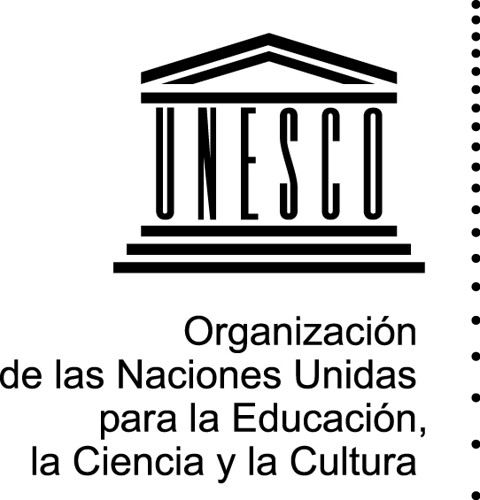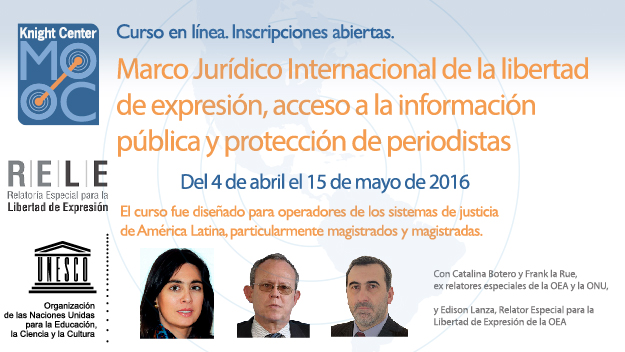Start learning today!
Get early access to learning opportunities from Journalism Courses by the Knight Center.

Due to the success of last year’s offering of the massive online course “International Legal Framework on Freedom of Expression, Access to Information and the Safety of Journalists,” which had more than 1,200 registered participants from across Latin America, the course will be offered again starting April 4.
Like the previous offering, the course is aimed at judges and other judicial officers (prosecutors, attorneys, lawyers, etc.) in Latin America.

The course is offered by the United Nations Educational, Scientific and Cultural Organization (UNESCO) and the Special Rapporteur for Freedom of Expression of the Inter-American Court on Human Rights (IACHR), with support from the Knight Center for Journalism in the Americas at the University of Texas at Austin.
From Feb. 15 to March 25, judges and other judicial officers from the region can register for the course, which is in Spanish, for free.
To apply, create an account at JournalismCourses.org, the platform where the course is taught. You will then receive an email confirmation with instructions for verifying the account. One your account is confirmed, complete the online application form available here. All applications will be reviewed. Participants must wait at least 72 hours to receive a notification.
The Ibero-American Judicial Summit, the Latin American Network for Schools of Judges, the Foundation for Press Freedom, the Latin American Internet Association, the Swedish Government and various regional judicial schools and institutions support the initiative.
“This initiative goes beyond the idea of solely training judicial operators, together we are strengthening the regions judicial systems. We want to encourage a broad regional debate on the protection and promotion of freedom of expression in the context of the judicial branch,” said Lidia Brito, Director of the Regional Bureau for Sciences in Latin America and the Caribbean of UNESCO.
“Freedom of expression and the right to information are fundamental rights that enable one to exercise all other human rights,” UNESCO said in a press-release announcing the MOOC. “This right also has a central role in achieving the objectives of sustainable development, particularly in order to promote peaceful and inclusive societies with accessible justice for all.”
“We are very impressed with the success we have had with previous versions of this course. Evaluations of the three previous editions have enabled us to see how important this issue is for judges and other judicial officials,” said Professor Rosental Alves, founder and director of the Knight Center at the University of Texas. “Thanks to digital technology, for the first time, we have succeeded in bringing together many judges from all Latin American countries in a virtual training program on international legal framework for freedom of expression.”

The course will be offered in six weekly modules from April 4 to May 15. There are video lectures, reading materials, quizzes, discussions and assigned activities. The course is asynchronous so there are no live activities scheduled. Lessons can be completed at the student’s pace, in the most convenient times and days for the students within each week.
Students who successfully complete the course and quizzes will be able to download a certificate of completion, which does not have any kind of university credit but documents successful participation in this online program.
Instructors are Catalina Botero, former Special Rapporteur for Freedom of Expression at the IACHR, and Frank la Rue, former UN Special Rapporteur on the Promotion and Protection of the Right to Freedom of Opinion and Expression. The current Special Rapporteur for Freedom of Expression at the IACHR, Edison Lanza, and UNESCO’s representative in South America Guilherme Canela, also participate.
The course focus on topics such as, the international legal framework on freedom of expression, the role of judicial operators in the investigating and prosecuting of crimes committed against journalists and human rights defenders, the challenges to using criminal law for ensuring the right to exercise freedom of expression and opinion, new challenges to freedom of expression such as freedom of expression and the internet, the right to public information and diversity and pluralism in the media.
“This space for interaction and dialogue between the Inter-American System for Human Rights and judicial operators in Latin America is key to promoting the incorporation of regional standards in national jurisprudence,” said Edison Lanza, Special Rapporteur for Freedom of Expression of the IACHR. “This initiative, and the promotion and collaboration in which the States fulfill their international responsibilities, is the most effective way to ensure national justice in cases of freedom of expression.”
UNESCO and the Special Rapporteur offered a pilot version of this course directed exclusively to judicial officials in Mexico in November 2014. In September 2015, a similar course designed exclusively for judicial operators in Coahuila, México was offered. This was the first course of its kind offered at the state level. Finally, in late 2015, the course was offered at the Latin American level.
Get early access to learning opportunities from Journalism Courses by the Knight Center.